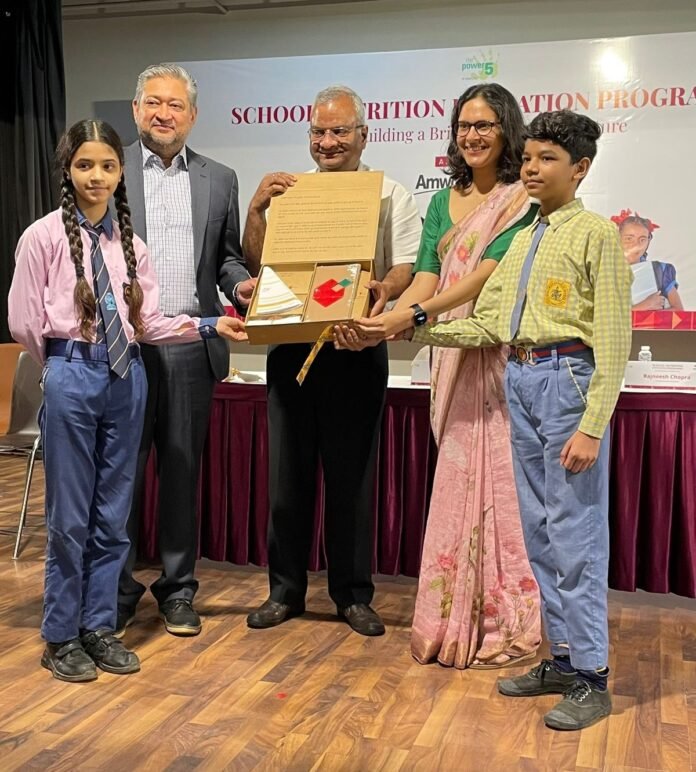New Delhi, September 2, 2025 – Amway India has announced the expansion of its flagship ‘Power of 5 (Po5)’ initiative into school-based nutrition education, launching a comprehensive program targeting India’s critical nutrition awareness challenge. The School Nutrition Education Program, developed in partnership with Nourishing Schools Foundation, represents a strategic shift from addressing food access to building fundamental nutrition literacy among young Indians.
Strategic Program Launch Addresses National Nutrition Crisis
The initiative, launched during National Nutrition Week under the theme ‘Eat Right for a Better Life,’ addresses a fundamental gap in India’s approach to nutrition challenges. Rather than focusing solely on food availability, the program targets the underlying issue of nutrition awareness and healthy habit formation during critical developmental years.
Comprehensive Program Scope and Impact
Target Demographics and Reach:
- 12 Partner Schools: Government and NGO-operated institutions across Delhi and Chennai
- 12,000+ Beneficiaries: Total community impact expected in first year of implementation
- 3,000 School Children: Direct program participants receiving intensive nutrition education
- Multi-Stakeholder Approach: Corporate, non-profit, and government education department collaboration
Program Duration and Structure:
- 12-Month Intervention: Comprehensive curriculum integration over full academic year
- Daily Activity Integration: Nutrition education embedded in regular school activities
- Specially Designed Toolkit: Interactive games, educational materials, and visual learning aids
- Teacher Training Component: Educator empowerment for sustainable program delivery
Leadership Vision: Building Generational Change
Rajneesh Chopra, Managing Director of Amway India, articulated the program’s strategic importance: “School-age is a decisive stage to shape lifelong habits, and nutrition is at the heart of that journey. According to the Comprehensive National Nutrition Survey (CNNS), every second adolescent faces poor nutrition, with widespread deficiencies in iron, vitamin A, and zinc. By investing in early, preventive action, we are not just teaching children about healthy diets; we are empowering them to become agents of change in their communities.”
Corporate Social Impact Philosophy
Chopra further emphasized Amway’s comprehensive approach: “This partnership with the Nourishing Schools Foundation is an extension of our commitment to help transform 5 million lives in India through an inclusive, community-driven approach. It reflects our broader social impact philosophy, integrating health and wellbeing into everything we do, building need-based, evidence-led interventions, and working hand-in-hand with grassroots organisations, government, and global agencies.”
Program Innovation: Interactive Learning Methodology
Comprehensive Education Framework
The School Nutrition Education Program employs a multi-dimensional approach to behavior change and knowledge building:
Core Program Components:
- Nutrition Awareness Building: Fundamental understanding of healthy eating principles and nutritional requirements
- Healthy Habit Formation: Practical application of nutrition knowledge in daily life choices
- Teacher Training and Empowerment: Educator capacity building for sustainable program delivery
- Progress Tracking and Monitoring: Systematic measurement of learning outcomes and behavior change
- Volunteer Engagement: Community involvement and peer-to-peer learning facilitation
- Student Empowerment: Development of children as health advocates within their communities
Interactive Learning Tools:
- Gamified Education: Educational games making nutrition learning engaging and memorable
- Visual Learning Aids: Age-appropriate materials supporting diverse learning styles
- Hands-on Activities: Practical exercises connecting nutrition theory to real-world application
- Peer Learning Programs: Student-led initiatives fostering community building and knowledge sharing
Partnership Excellence: Collaborative Impact Model
Archana Sinha, Co-founder of Nourishing Schools Foundation, highlighted the partnership’s strategic value: “Schools have an unparalleled ability to shape young minds and influence family and community behaviours. By equipping children with the right knowledge, skills, and resources, we can create a ripple effect of healthier choices that lasts a lifetime. This collaboration with Amway India is about combining expertise, resources, and vision to make nutrition education a core part of the learning experience for every child.”
Multi-Stakeholder Integration
The program’s success stems from comprehensive stakeholder engagement across multiple sectors:
Government Collaboration:
- Delhi Education Department Partnership: Official support and integration with public education system
- Policy Alignment: Program design supporting government nutrition and education objectives
- Resource Optimization: Leveraging existing educational infrastructure for maximum impact
- Scalability Framework: Model development for potential nationwide implementation
Non-Profit Sector Engagement:
- Nourishing Schools Foundation Expertise: Specialized knowledge in school-based nutrition interventions
- Community Organization Networks: Grassroots connections enabling deep community penetration
- Implementation Experience: Proven methodologies for sustainable program delivery
- Monitoring and Evaluation: Comprehensive impact assessment and program optimization
National Impact: Viksit Bharat 2047 Alignment
Long-Term Vision and Generational Change
The program aligns strategically with India’s vision for Viksit Bharat by 2047, recognizing that today’s nutrition literacy investments will create tomorrow’s healthy communities.
Generational Impact Strategy:
- Child Advocacy Development: Training children to become health advocates within their families and communities
- Ripple Effect Creation: Individual behavior change driving broader community health improvements
- Knowledge Transfer Systems: Children sharing nutrition literacy with family members and peer networks
- Community Health Leadership: Developing next generation of health-conscious community leaders
Sustainable Development Alignment:
- Health and Wellbeing Focus: Contributing to UN Sustainable Development Goal 3 (Good Health and Well-being)
- Quality Education Integration: Supporting SDG 4 through innovative educational approaches
- Community Empowerment: Building local capacity for sustained health improvement initiatives
- Economic Development: Improved nutrition supporting enhanced learning outcomes and future productivity
Comprehensive Corporate Social Responsibility Framework
Amway India’s Proven Track Record
The School Nutrition Education Program builds on Amway India’s extensive 27-year history of community impact and social innovation:
Quantified Impact Achievements:
- 1.7 Million Beneficiaries: Total people impacted across all CSR initiatives over 27 years
- 740,000 People Reached: Specific impact through existing Power of 5 nutrition programs
- 130,000 Children Supported: Direct child beneficiaries of nutrition-focused interventions
- 5 Million Lives Target: Ambitious goal for transformative community impact
Multi-Sectoral Program Portfolio
Power of 5 Nutrition Initiative:
- Childhood Malnutrition Focus: Systematic approach to addressing nutritional deficiencies in children
- Community-Based Interventions: Grassroots programs targeting vulnerable populations
- Evidence-Based Methodology: Data-driven approaches ensuring program effectiveness
- Scalable Implementation: Models designed for replication across diverse geographic contexts
Livelihood Skills Development:
- Women’s Entrepreneurship: Self-employment and business development training for underprivileged women
- Geographic Reach: Programs spanning Uttar Pradesh, Bihar, Delhi, Himachal Pradesh, West Bengal, and Tamil Nadu
- 3,000+ Beneficiaries: Direct impact on women’s economic empowerment and family welfare
- Sustainable Income Generation: Focus on creating long-term economic opportunities
Healthcare Access Enhancement:
- Telemedicine Centers: Five centers established in Dindigul district for rural healthcare access
- 35,000 Annual Patients: Target beneficiary reach through telemedicine services
- Distance Barrier Elimination: Technology-enabled healthcare delivery to remote communities
- Free Medical Treatment: No-cost healthcare services for underserved populations
Recognition and Industry Leadership
Award Recognition and External Validation
Amway India’s commitment to social impact has earned significant recognition from industry and government organizations:
Prestigious Awards Received:
- FICCI CSR Award: Recognition for corporate social responsibility excellence
- Golden Peacock CSR Award: Industry acknowledgment of sustainable business practices
- Aaj Tak Care Award: Media recognition for community impact initiatives
- ESG Award: Environmental, Social, and Governance leadership recognition
- CSR Times Award: Four consecutive years (2018-2021) for comprehensive social impact programs
Recognition Categories:
- Malnutrition Eradication: Systematic approach to addressing childhood nutrition challenges
- Environmental Conservation: Water and soil conservation initiatives
- Inclusive Development: Support for differently-abled individuals
- Women’s Empowerment: Comprehensive programs supporting underprivileged women
- Child Health Improvement: Focus on improving nutritional status of children under 6 years
Innovation in Corporate Social Responsibility
Beyond Traditional Philanthropy
Amway India’s approach to CSR represents a fundamental shift from traditional charitable giving to strategic social innovation:
Innovation Framework:
- Social Innovation Focus: Creating sustainable solutions rather than temporary relief
- Community-Driven Approach: Local ownership and participation in program development
- Evidence-Based Interventions: Data-driven program design and continuous improvement
- Systematic Impact Measurement: Comprehensive monitoring and evaluation systems
Integration Philosophy:
- Business Strategy Alignment: CSR initiatives supporting core business values and objectives
- Long-Term Commitment: Multi-year programs ensuring sustainable impact
- Stakeholder Collaboration: Partnerships maximizing resource efficiency and impact scale
- Knowledge Sharing: Contributing to broader social sector learning and development
Program Implementation Strategy
Systematic Rollout and Scale Development
The School Nutrition Education Program employs a phased implementation approach designed for maximum impact and sustainable scaling:
Phase 1: Foundation Building (Months 1-3)
- School Partnership Development: Formal agreements and program customization with participating institutions
- Teacher Training Implementation: Comprehensive educator preparation for program delivery
- Toolkit Distribution and Training: Educational material deployment and usage training
- Baseline Assessment: Pre-program measurement of student knowledge and behavior patterns
Phase 2: Active Implementation (Months 4-9)
- Daily Activity Integration: Full curriculum implementation across all participating schools
- Student Engagement Programs: Interactive learning activities and peer education initiatives
- Community Outreach: Family and community involvement in nutrition education
- Progress Monitoring: Regular assessment of program effectiveness and student progress
Phase 3: Evaluation and Scaling (Months 10-12)
- Impact Assessment: Comprehensive evaluation of program outcomes and community impact
- Model Refinement: Program optimization based on implementation experience and feedback
- Scaling Strategy Development: Framework creation for geographic and demographic expansion
- Sustainability Planning: Long-term program sustainability and community ownership development
Future Vision and Expansion Opportunities
Scalability Framework and National Impact Potential
The program’s design incorporates systematic scalability considerations, positioning it for potential nationwide implementation:
Expansion Readiness Factors:
- Replicable Methodology: Standardized approaches adaptable to diverse cultural and geographic contexts
- Partnership Model: Framework for engaging local stakeholders across different regions
- Resource Efficiency: Cost-effective implementation enabling broad-scale deployment
- Technology Integration: Digital tools supporting remote program delivery and monitoring
Long-Term Impact Vision:
- National Nutrition Literacy: Contributing to comprehensive improvement in India’s nutrition awareness
- Educational System Integration: Model for incorporating health education into standard curriculum
- Community Health Transformation: Systematic improvement in community health outcomes
- Economic Development Support: Improved nutrition supporting enhanced productivity and economic growth
About Amway India: Health and Wellbeing Leadership
Amway India operates as a leading health and wellbeing company committed to helping people live better lives through comprehensive product offerings and community impact initiatives. The company’s philosophy integrates business success with social responsibility, creating sustainable value for communities while building a profitable, purpose-driven enterprise.
Core Business Philosophy
Mission-Driven Approach:
- Empowerment Focus: Helping individuals take charge of their health and wellbeing through informed choices
- Evidence-Based Solutions: Product development and program design grounded in scientific research
- Community Integration: Deep engagement with local communities and grassroots organizations
- Sustainable Impact: Long-term commitment to creating lasting positive change
Strategic Differentiators:
- Comprehensive Approach: Integration of product innovation, education, and community impact
- Local Market Understanding: Deep knowledge of Indian health challenges and cultural contexts
- Partnership Excellence: Collaborative relationships with government, non-profit, and community organizations
- Quality Commitment: Uncompromising standards in product development and program implementation






